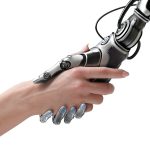 It’s easy to imagine AI in Matrix like terms as being super-intelligent and capable of feats beyond that of mere man, but a team from Yale University highlight how even seemingly ‘dumb’ AI can still play a big role in our lives.
It’s easy to imagine AI in Matrix like terms as being super-intelligent and capable of feats beyond that of mere man, but a team from Yale University highlight how even seemingly ‘dumb’ AI can still play a big role in our lives.
Across a number of experiments, the researchers pitted human players and AI players together and found that the inclusion of bots in the human teams provided a universal boost to performance.
“Much of the current conversation about artificial intelligence has to do with whether AI is a substitute for human beings. We believe the conversation should be about AI as a complement to human beings,” the authors say.
Improving team work
The research is part of a wider body of work conducted at Yale into the dynamics of social networks. The project, known as Breadboard, aims to uncover how networks influence everything from economic inequality to group violence.
This latest experiment saw an online game developed within which players had to coordinate their actions towards a collective goal. Spice was added by the participant of anonymous bots that participated alongside the human players. The bots were programmed with three levels of behavior that meant they sometimes made mistakes, albeit on purpose. The game was undertaken on proprietary software developed for Breadboard.
“We mixed people and machines into one system, interacting on a level playing field,” the researchers say. “We wanted to ask, ‘Can you program the bots in simple ways?’ and does that help human performance?”
The answer to both was an unequivocal yes. The inclusion of bots into a team improved the performance of human players on the tasks, and was especially useful when the tasks were challenging. Overall, the presence of bots improved the time taken to complete the tasks by 55.6%.
What’s more, this created a ripple effect, with the presence of bots improving the performance of the humans in contact with them, who then influenced the other human players to up their own performance levels.
The researchers believe the findings could have a number of implications, especially as we engage more with AI in the coming years. For instance, as more of our driving is undertaken by autonomous vehicles, it’s easy to see how standards could be raised, and indeed a recent study highlighted how even low numbers of autonomous vehicles can improve road safety.
“There are many ways in which the future is going to be like this,” the authors say. “The bots can help humans to help themselves.”
It’s an interesting study in an area that is only going to grow in importance. Check out the video below to learn more about the Breadboard platform.